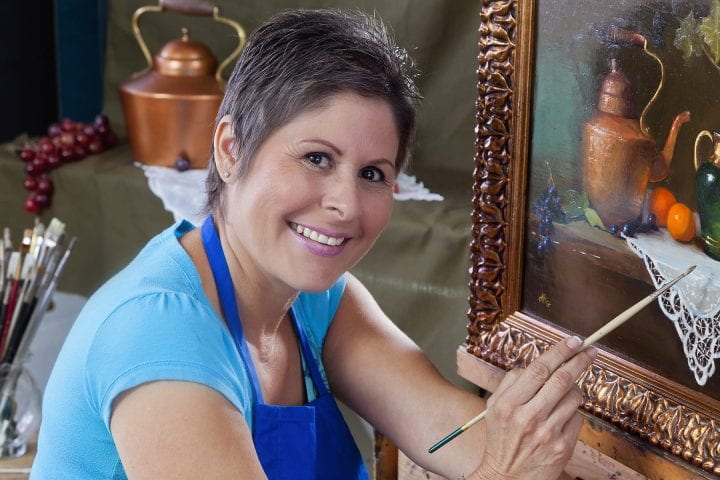A brush with ovarian cancer
Artist treated at UC Irvine Medical Center plans to be among the 30 percent who beat the odds.

Alice Hernandez-Gaona had no doubt: 2010 was shaping up to be the best year of her life. At 47 and recently remarried, she had made her first foray into art shows, culminating in an invitation to Laguna Beach’s Art-A-Fair, where her oil paintings had been well received. A lifelong passion had flowered into a career.
Back at her easel after the festival, Gaona made a doctor’s appointment for nagging abdominal pain. Her Sept. 9 visit to a gastroenterologist ended in a community hospital emergency room, where doctors said fluid in her abdomen suggested ovarian cancer that had spread. Stunned, Gaona was immediately admitted, and a specialist from UC Irvine Medical Center was called in.
“I thought, ‘Oh my god, the best year of my life is turning into the worst,’” says the Long Beach mother of two, who had run five miles and played a round of golf only a few days earlier. “I was healthy, and now I was going to die.”
UC Irvine’s Dr. Krishnansu Tewari, a leading gynecologic oncology specialist and researcher, confirmed the diagnosis and told Gaona that he wanted to operate at the medical center’s UC Irvine Douglas Hospital, where he could use the most advanced surgical facilities in Orange County.
Tewari didn’t sugarcoat the situation. Ovarian cancer is the fifth-most common and most lethal cancer among U.S. women, killing about 15,000 each year, mainly due to delayed diagnoses. Tewari and his team performed extensive surgery, removing Gaona’s ovaries, uterus, fallopian tubes, spleen and appendix, as well as part of her colon and rectum.
He excised all visible cancer and reconnected her colon to ensure normal bowel function. Based on the size and extent of the tumors, Tewari determined that it was stage IIIC ovarian cancer– just short of the most severe stage IV.
Treatment didn’t end there. Orange County’s only university hospital offered Gaona clinical trials not readily available elsewhere. She volunteered to undergo extensive chemotherapy in one of the largest ovarian cancer clinical trials in the West.
Tewari leads the study – sponsored by the nonprofit Gynecologic Oncology Group and the National Cancer Institute – at UC Irvine’s Chao Family Comprehensive Cancer Center. It involves a multipronged attack on ovarian cancer at the cellular level.
Trial patients are randomly assigned to one of three groups. Gaona’s group received intraperitoneal therapy, in which the drug carboplatin is delivered directly into the abdominal cavity; high doses of a second drug, Taxol, are administered intravenously once a week; and a third drug, Avastin, is used to starve lingering cancer cells.
“These are three of the most important areas in ovarian cancer research, so I’m really excited,” says Tewari.
Now that Gaona is in the trial’s final phase, she just gets Avastin every three weeks at the hospital’s infusion center, which she has dubbed “Club Med” because of its attentive nurses, staff and volunteers. Her chemotherapy will end in early March 2012, but Gaona is already considered in remission.
Her blood tests for the protein indicator for ovarian cancer showed a dramatic drop-off after about four months of chemotherapy, suggesting that the clinical trial is having the hoped-for effect. Seven in 10 women with ovarian cancer die within five years of diagnosis, but Tewari is cautiously optimistic about Gaona.
“She’s doing great,” he says. “If we can get her to five years in remission, we’ll have a party at her studio.”
Through it all, Gaona has continued running, golfing and, of course, painting. She’s grateful to Tewari and his team, most of whom attended this year’s Art-A-Fair opening, at which Gaona won the award for best painter in oils.
“Dr. Tewari has always done exactly what he said he would do,” she says. “That first day, he assured me that he would keep me alive – and he has.”